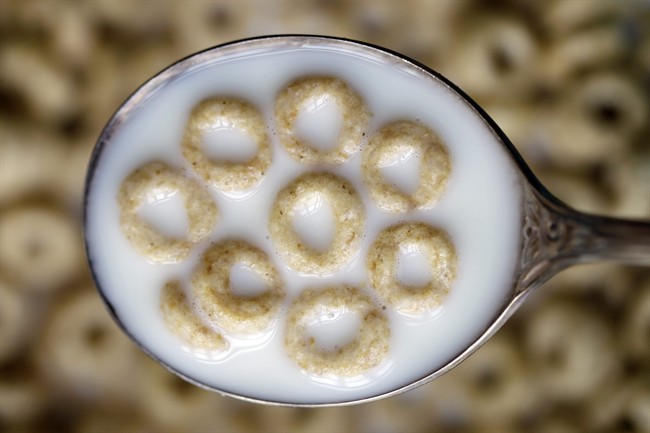Traces of a chemical used to kill weeds have been found in a number of breakfast cereals, oats and granola bars, and it could increase cancer risks for children, according to a study by an environmental research group.

In the report released Wednesday, the U.S.-based Environmental Working Group (EWG), said after testing 45 breakfast foods, such as Quaker Oates, Cheerios and Lucky Charms, the weed-killing chemical glyphosate, was found in all but two samples.
Glyphosate is the active ingredient in Roundup, the Monsanto weed killer that is considered the most widely-used in the world. Controversy has grown about possible links to cancer.
“Almost three-fourths of those samples had glyphosate levels higher than what EWG scientists consider protective of children’s health with an adequate margin of safety,” the EWG stated in the report.
WATCH: New Brunswick residents protest glyphosate spraying

Sylvain Charlebois, a professor in food distribution and policy at Dalhousie University, said the chemical in question is quite controversial as there is still no consensus on glyphosate’s health risks.
The report’s findings
The organization’s health benchmark for traces of glyphosate found in food is 160 parts per billion. The benchmark provides a framework for how much glyphosate humans can ingest daily without having potentially negative health effects.
The organization found that Quaker Old Fashioned Oats had levels higher than 1,000 ppb.
Three Cheerios samples had levels ranging from 470 ppb to 530 ppb. Lucky Charms were tested in two samples and found to have 400 ppb and 230 ppb levels. And Quaker Dinosaur Eggs Instant Oatmeal tested around 700 ppb.
A Quaker spokesperson responded to the report on Wednesday saying: “While our products comply with all safety and regulatory requirements, we are happy to be part of the discussion and are interested in collaborating with industry peers, regulators and other interested parties on glyphosate.”
A General Mills spokesperson said: “Our products are safe and without question, they meet regulatory safety levels.”
Can glyphosate cause cancer? Depends who you ask
The human health effects of glyphosate are highly debated, with some health advocates saying it’s known to cause cancers and others arguing there is no associated risk.
“There are over 800 literature articles, which suggest that it is not cancerous, while other groups are stating the opposite,” Charlebois said. “It may cause cancer with a capital M. Everyone is being very cautious as science is inconclusive.”
Both the World Health Organization and California state scientists have found links between the herbicide and cancer.
The World Health Organization has called glyphosate a “probable carcinogen” and authorities in California list it as a chemical “known to the state to cause cancer.”
The American Cancer Society also lists it as a “probable carcinogen.”
The National Pesticide Information Center said studies on cancer rates in people have provided conflicting results on whether the use of glyphosate-containing products is associated with cancer. “Some studies have associated glyphosate use with non-Hodgkin lymphoma,” the organization stated on its website.
Many scientists and scientific organizations, including the U.S. Environmental Protection Agency, state that in the amounts commonly consumed in food, glyphosate is not harmful to human health.
A recent major study, published by researchers at the National Institutes of Health, “observed no associations between glyphosate use and overall cancer risk.”
What does the Environmental Protection Agency say?
In 2017, the Environmental Protection Agency (EPA) released a statement saying that glyphosate “is not likely to be carcinogenic to humans,” but there is potential for effects on birds, mammals and plants.
The EPA said that when the chemical enters the body, “it passes through the body relatively quickly. The vast majority of glyphosate leaves the body in urine and feces without being changed into another chemical.”
The Food and Drug Administration (FDA), said that based on 2016 samples, it had not found any violations of EPA standards with glyphosate.
“Certain trace amounts of pesticides, or pesticide chemical residues, may remain in or on some crops after they’re harvested,” the FDA stated on its website.
But on Wednesday, the FDA said it would consider reviewing more samples in the wake of the EWG’s findings.
Scott Partridge, a vice-president at Monsanto, said in an interview on Wednesday that hundreds of studies had validated the safety of glyphosate and that it doesn’t cause cancer. He called the Environmental Working Group an activist group.
“They have an agenda,” he said. “They are fear mongering. They distort science.”
Monsanto pays millions after man says Roundup caused his cancer
The Environmental Working Group’s finding comes a week after a California jury ordered Monsanto to pay $289 million in damages to a man dying of cancer, which he said was caused by his repeated exposure to large quantities of Roundup and other glyphosate-based weed killers while working as a school groundskeeper.
Monsanto now faces more than 5,000 similar lawsuits across the U.S. over claims it did not warn of the cancer risks of glyphosate-based weedkillers, including its Roundup brand.
WATCH: Monsanto found liable in lawsuit alleging weed-killer caused cancer

What about here in Canada?
In 2017, the Canadian Food Inspection Agency said it has found trace amounts of glyphosate in roughly 30 per cent of food products it tested, and residue levels above the recommended limits in nearly four per cent of grain products.
But Health Canada lists it as a safe product.
“The health effects noted in animals occur at doses more than 100 times higher (and often much higher) than levels to which humans are normally exposed when glyphosate products are used, according to label directions,” the health agency said.
— With files from Global News’ Andrew Russell









Comments